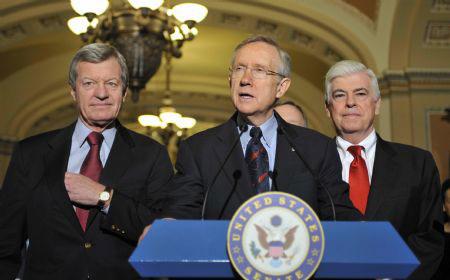No easy feat for Obama to close deal on healthcare reform
2009-12-25 08:12 BJT
By Xinhua writer Yang Qingchuan
WASHINGTON, Dec. 24 (Xinhua) -- After weeks of debating, the U.S. Senate passed a landmark healthcare bill on Thursday, which would greatly expand healthcare coverage and usher in the biggest change in the U.S. healthcare system in decades.
 |
| U.S. Senate majority leader Harry Reid (C) speaks during a news conference in Washington Dec. 24, 2009.(Xinhua/Zhang Yan) |
The rare Christmas-eve vote sent a hard-won victory for President Barack Obama and his fellow Democrats, marking an important step toward the end of the deal. But the final step -- reconciling the Senate bill with the one passed by the House of Representatives last month -- remains a challenge.
"INCREDIBLY CLOSE"
Obama said after the Senate vote that the country was "incredibly close to making health insurance reform a reality."
Indeed, Obama has made advancement on the issue further than any of his predecessors.
Ever since Teddy Roosevelt proposed healthcare reform in 1912, seven presidents had attempted to overhaul the country's flawed healthcare system, but no reform legislation had passed any chamber of Congress.
Calling the vote "historic," Obama said it will "bring us to the end of a nearly century-long struggle to reform America's healthcare system."
"With passage of reform bills in both the House and the Senate, we are now finally poised to deliver on the promise of real, meaningful health insurance reform that will bring additional security and stability to the American people," said Obama.
The president said the legislation would hold the insurance industry accountable while workers will not have to worry about losing coverage if they lose or change jobs.
"Families will save on their premiums. Businesses that would see their costs rise if we do not act, will save money now and they will save money in the future."
This bill will also strengthen Medicare -- the health in suranceprogram for the elderly and disabled -- and extend the life of the program, making healthcare insurance coverage affordable for over 30 million Americans who do not have it, said Obama.
It will help reduce national deficit by as much as 132 billion U.S. dollars over the next decade, he claimed.

 Mail
Mail Share
Share Print
Print


 Video
Video









 2009 China Central Television. All Rights Reserved
2009 China Central Television. All Rights Reserved